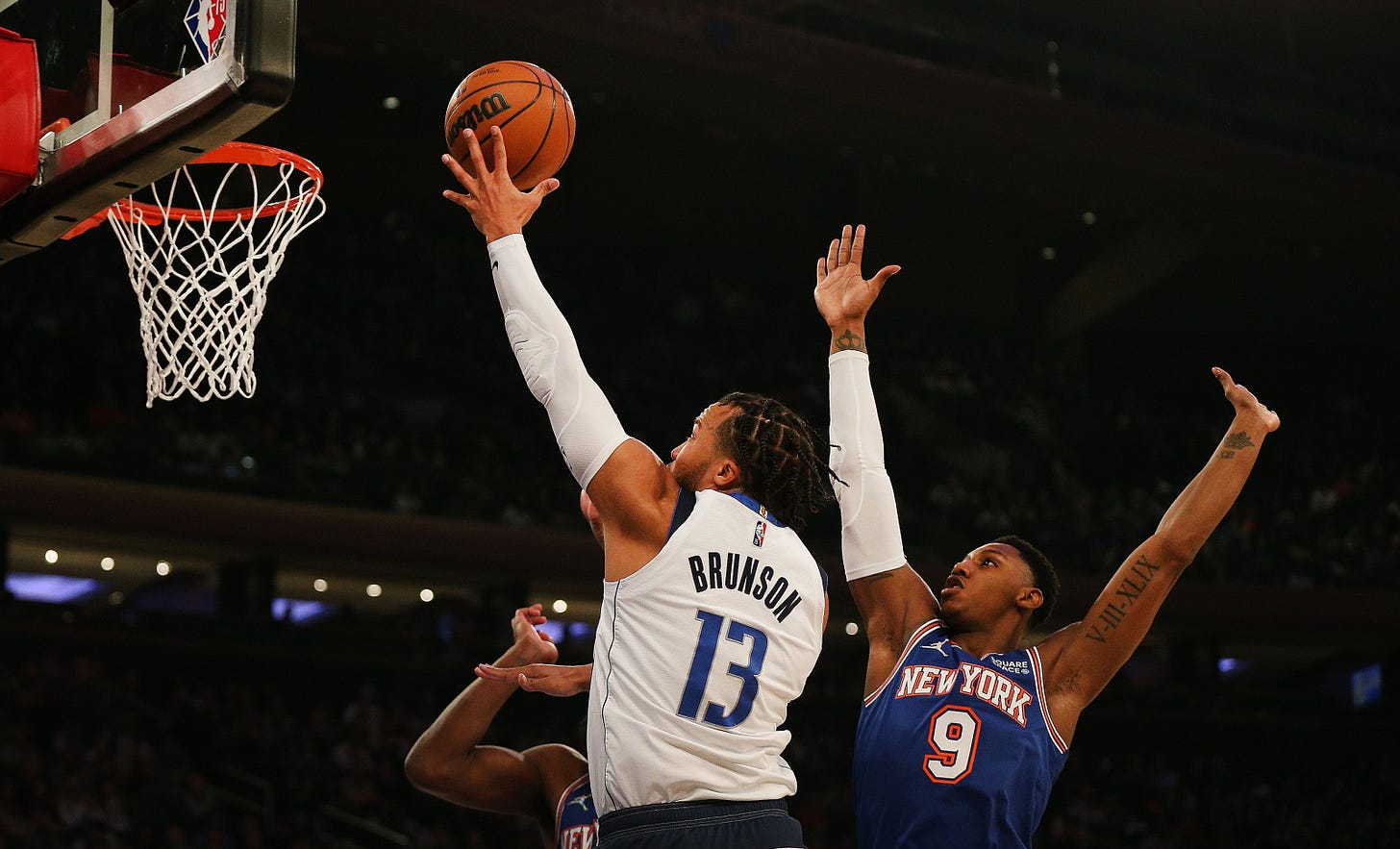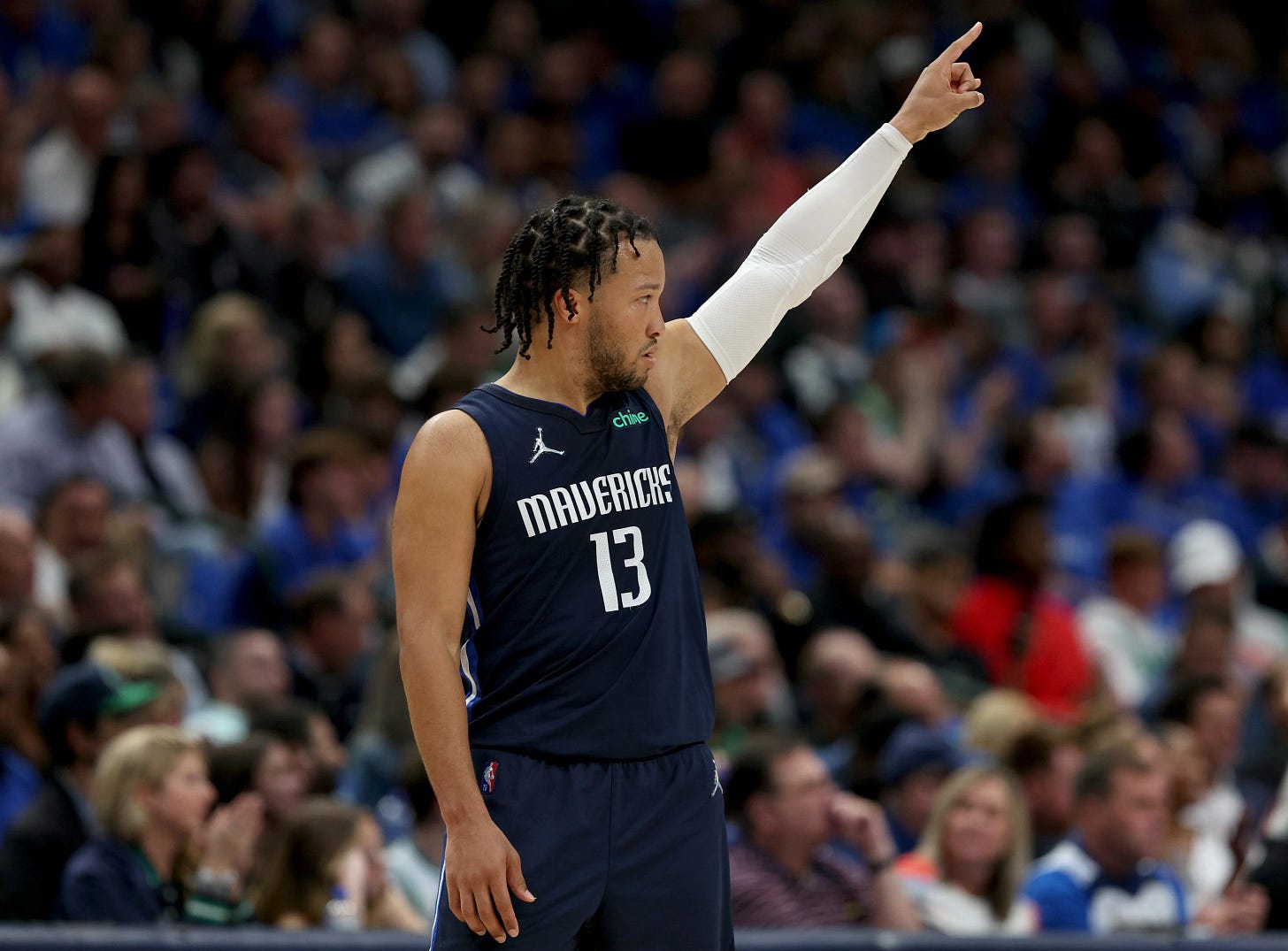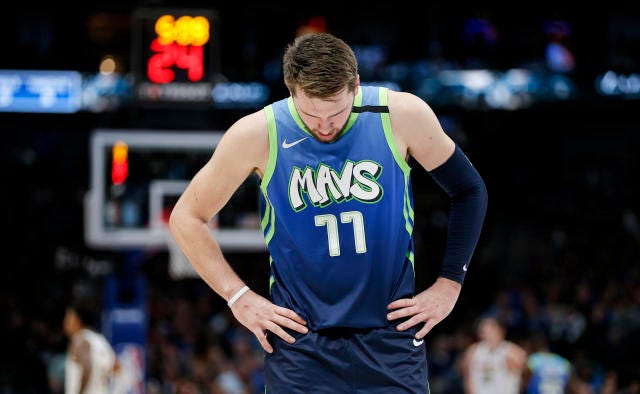Is Jalen Brunson worth $100 Million?
Examining the modern NBA Salary Cap and a Reasonable Contract.
A recurring theme in my analysis is how hard it is to judge metrics in the NBA because of how much context matters. It’s hard to know if a player’s stats are good without comparing them to their teammates and the league first. And that’s after the “hard” work of figuring out what the stats are worth. Well, that last part is easy. Moving on.
The same becomes true of player salaries. It’s hard not to see headlines about the New York Knicks offering Jalen Brunson a $100 million contract and not quickly go - “There go the Knicks overpaying for players again!” But, the reality is that this contract is entirely reasonable. This headline is also so prevalent because the Mavericks got some infamy for lowballing Jalen Brunson with a $55 million deal before he went off in the playoffs helping the Mavericks reach the Conference Finals. Oddly the Knicks seem to keep “winning” against the Mavericks in such situations, and let’s use it to have a “fun” lesson on NBA salaries!
The “average” NBA team spent ~$131 million this past season on player salaries. $25 million is around 19% of an average team’s payroll. The average team put up 41 wins. Jalen Brunson earned 8.5 Wins Produced this season, equating to 21% of the average team contract. In short, by the current market, Jalen Brunson is fine. A few more notes.
Last season the NBA salary was $112 million. Next season it’s projected to go up by almost $12 million, over a 10% increase. And it’s worth noting, at least historically, that the salary cap, which is based on Basketball-Related Income, goes up!
Jalen Brunson is entering his prime
Jalen Brunson is 25 years old, basically prime for an NBA player. And here’s the progression of him. (WP48 estimates a player’s wins per 48 minutes, 0.100 is average, 0.200 is a star.)
22 - 0.087 WP48, 1591 Minutes, 2.9 Wins
23 - 0.142 WP48, 1022 Minutes, 3.0 Wins
24 - 0.171 WP48, 1697 Minutes, 6.1 Wins
25 - 0.161 WP48, 2524 Minutes, 8.5 Wins
Brunson, thus far, fits nicely in the well above average starter range, which is the contract he’s asking for. The real question is why the Mavericks gave minutes to other worse guards, but they seem to have course-corrected. Well, briefly. With Brunson leaving, we’ll see what they do now. Regardless. Getting a solid player in their prime at the market rate is good. The Knicks, also in the largest market, have a slight edge in “market rate.”
Yes, Dallas Dropped the Ball
While a common topic for me is overpaid players (hey, check out last article), a similar funny issue on the opposite end is to not worry about overpaying a little if it hinders a playoff squad.
Dallas has Luka Donic, a bonafide star; like Brunson, he is entering his prime. When you luck into a top player, you are always in “win now” mode. Brunson was the Mavericks’ second-best player last season. They may replace his production, but that’s hard for a few reasons.
The Mavericks are over the salary cap listed above. The NBA is a “soft-capped” league, so teams are allowed to go over, but it can get tricky. The current “Durant vs. Wiggins” argument is ludicrous. Yes, the Warriors won with Wiggins, and Durant flamed out in the first round of the playoffs. But the whole reason the Warriors could afford Wiggins was by trading Durant for D’Angelo Russell, which allowed them to trade for Wiggins. In the NBA, it is terrible to just “let players walk” as you can exchange it for other assets even with an overpaid contract. The Warriors made far from the optimal trade with Durant’s $30 million. But it still worked out. Even had Dallas “overpaid” Brunson, they could find a team, like the Knicks, willing to take him for other assets.
One last general note.
Wrapping Up - Be Human!
If, say, the Mavericks find a way into a solid replacement player for Brunson, and if it appears that was their plan, I’ll be quick to post an apology. But a bigger point I want to give as the “cold calculating analyst” is to avoid needless complications in running a team, including interaction with players. Yes, had Dallas gotten Brunson at $55 million, they would have saved a few million a season. But, if they “overpaid” Brunson by a few million, he’d have been happy, there would have been no contract issues, and, as shown this last year, he would have easily recouped that cost in the playoffs. It is super tempting to focus on absolute optimization when you’re a math person. A term called “Satisficing” is finding a "good enough” solution. And if this can be done quickly and without team strife, I recommend it. An NBA team should look for stars, focus on not having bad players, and upgrade players if such opportunities come around. They shouldn’t focus on exactly hitting value for contracts paid, especially as rookie contracts and max contracts give every team some wiggle room. Jalen Brunson is a satisfactory contract for the Knicks. He would have been an even better contract for the Mavericks at the same price, as they’re a contender. Here’s hoping the next Knicks/Mavericks contract fight goes in the Mavs’ favor, as between this and Porzingis, the Knicks, shockingly, are winning at something.
-Dre




